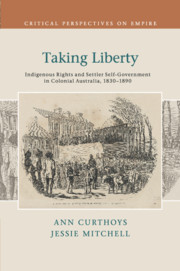Book contents
- Taking Liberty
- Critical Perspectives on Empire
- Taking Liberty
- Copyright page
- Contents
- Abbreviations
- Acknowledgements
- Maps
- Introduction
- Part I A Four-Cornered Contest: British Government, Settlers, Missionaries, and Indigenous Peoples
- Part II Towards Self-Government
- 6 Who Will Govern the Settlers?
- 7 ‘No Place for the Sole of Their Feet’
- 8 Who Will Govern Aboriginal People?
- 9 The Dark Side of Responsible Government?*
- Part III Self-Governing Colonies and Indigenous People, 1856–c.1870
- Part IV Self-Government for Western Australia
- Conclusion
- Index
9 - The Dark Side of Responsible Government?*
Britain and Indigenous People in the Self-Governing Colonies, 1854–1870
from Part II - Towards Self-Government
Published online by Cambridge University Press: 28 September 2018
- Taking Liberty
- Critical Perspectives on Empire
- Taking Liberty
- Copyright page
- Contents
- Abbreviations
- Acknowledgements
- Maps
- Introduction
- Part I A Four-Cornered Contest: British Government, Settlers, Missionaries, and Indigenous Peoples
- Part II Towards Self-Government
- 6 Who Will Govern the Settlers?
- 7 ‘No Place for the Sole of Their Feet’
- 8 Who Will Govern Aboriginal People?
- 9 The Dark Side of Responsible Government?*
- Part III Self-Governing Colonies and Indigenous People, 1856–c.1870
- Part IV Self-Government for Western Australia
- Conclusion
- Index
Summary
- Type
- Chapter
- Information
- Taking LibertyIndigenous Rights and Settler Self-Government in Colonial Australia, 1830–1890, pp. 235 - 252Publisher: Cambridge University PressPrint publication year: 2018



